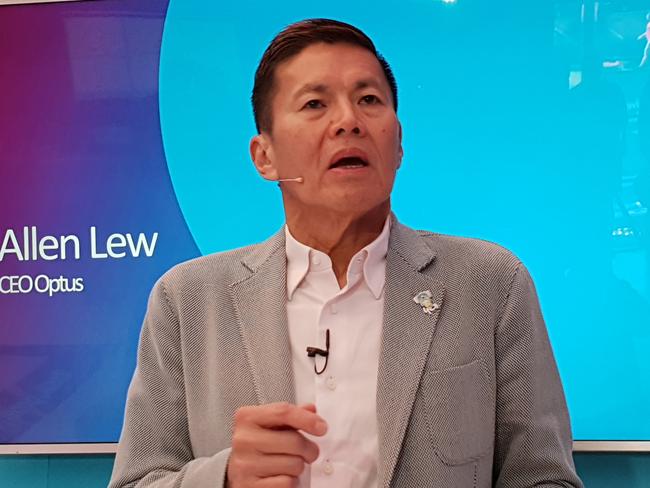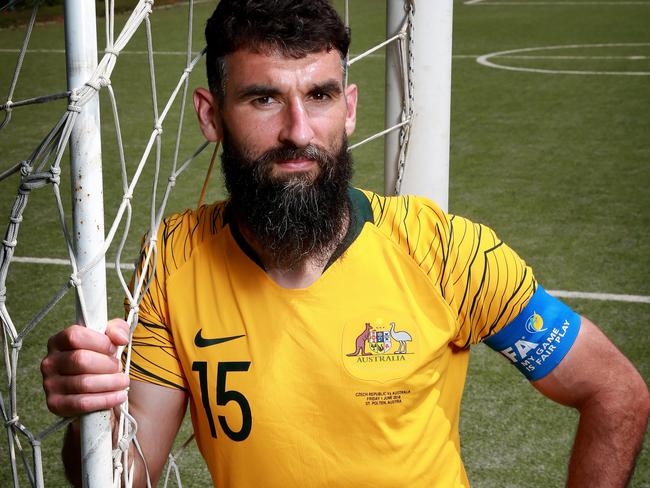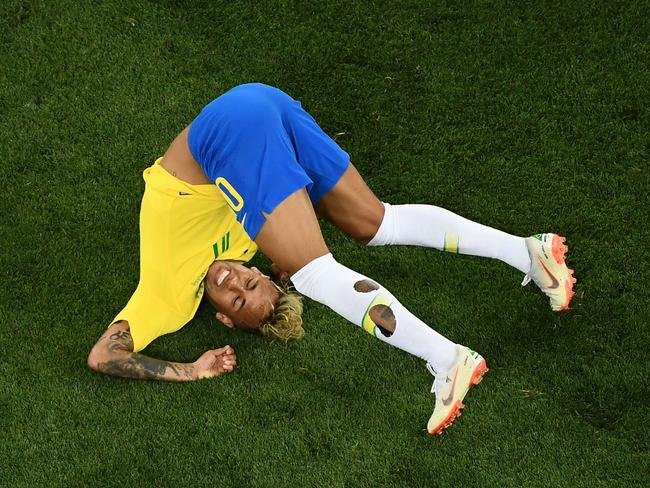Optus reveals World Cup coverage future after SBS deal
OPTUS has made an embarrassing concession, giving up its exclusive World Cup broadcast deal and handing cash back to customers.
OPTUS has dramatically struck a deal with SBS to allow the 2018 World Cup to remain on free to air TV for the next week — as it vows to hand cash back to customers who signed up to its streaming service.
Optus chief executive Allen Lew announced the embarrassing backdown via a phone conference with reporters Wednesday afternoon following a weekend of outrage from fans unable to watch games due to streaming problems.
Mr Lew confirmed SBS would broadcast every match in the group stages until June 29 however a decision has not yet been made as to whether Optus will retain its exclusive rights to broadcast two of the four quarter-final matches.
Optus also has exclusive rights to some round-of-16 matches, which SBS will not be able to screen, under the current agreement.
The telco has also announced a massive move to win back favour with Aussie World Cup fans by removing the $15 pay wall, which restricted Optus Sports content.
Optus has made a decision to leave its app and sport streaming services free and open to everyone in Australia for the remainder of the World Cup and through to August 31.
The telco says Australians who have already paid for the service will receive full refunds.
That move would allow Australian sport streamers to also get the opening few weeks of the 2018-19 English Premier League season free through Optus.

Mr Lew was keen to present the decision as a way to provide Australians with the choice they want when it came to the World Cup, saying on more than one occasion that Optus had “learnt a very important lesson” from the drama.
He told news.com.au his company has “taken a hit, but not a significant hit” as a result of lost subscriptions and returning $15 payments already made by Aussie World Cup fans.
“We will recover from this. It’s not a bet that will break the company. It’s well within what we can afford,” Mr Lew said.
“I can only tell you it’s not significant in terms of Optus’ bottom line. It’s something that is well within the risk that we took when we went into this game.
“The money we are giving back pales in comparison to the money we are spending in terms of the studio that we’ve built and the people on the ground that we have in Moscow.
“From a cost point of view it’s a hit, but it’s not a significant hit.”
Despite having major issues delivering its stream to the customers that had already paid, Mr Lew said Optus had conducted extensive testing and improvements on its network and had “absolute confidence” it could handle new users taking advantage of the free offer.

“We have made it more resilient that when we open it up we will have the capacity,” he said.
The under-fire telco agreed earlier this week to let SBS broadcast four extra matches over Monday and Tuesday night after its streaming service dropped out on the weekend, causing fury among customers who paid $15 to see most matches.
The latest decision comes as a major blow for the telco, which lured the exclusive rights away from SBS in an $8 million deal that saw games behind a paywall in Australia for the first time.
Mr Lew said he had “no regrets” about buying the World Cup rights.
“We’re not perfect; we’ve made a mistake,” he said.
A deal between SBS and Optus allowed the publicly funded network to broadcast 25 games. However, that increased to 29 matches after Optus announced its decision to allow SBS to screen every World Cup match for a 48-hour period as the Telco moved to fix its technical problems.
The faulty Optus streaming service prompted Mr Lew to apologise “unreservedly to all Australians” on Sunday, but there were further issues that night.
Australian Prime Minister Malcolm Turnbull tweeted on Monday: “I have spoken with the Optus CEO, Allen Lew. He assures me he is giving the World Cup streaming problems his personal attention and he believes it will be fixed this evening.”
While Optus execs projected confidence during the past 48 hour period, assuring the public (and the Prime Minister) it would fix the problems plaguing its network, its decision to confirm it would take back control seemingly came down to the wire for the beleaguered telco.
Despite a small number of users still reporting issues trying to watch the World Cup games on the Optus Sports stream on Tuesday night, Optus public affairs vice-president Andrew Sheridan told news.com.au early this afternoon that the network had performed better than the weekend period that saw fans direct a torrent of online abuse at the telco.

SBS originally onsold the World Cup broadcast rights to Optus Sport, with Fairfax Media reporting that deal was worth about $8 million.
Buying up the rights to the English Premier League (EPL) a couple years ago and following it up with taking on the World Cup was a big gamble for Optus and represented a massive shift in Australia’s media landscape.
The streaming quality of its EPL coverage was also criticised when it first launched in 2016 with some users complaining about picture quality, buffering issues and delays.
But despite the hefty price tag, the move has been largely good for the telco. Securing the EPL rights, which Optus recently locked in until 2022, is considered one of the main reasons it won 384,000 new mobile customers last fiscal year, which ended in March.
Unlike the EPL though, the World Cup coverage was made available to non-Optus customers on a variety of platforms, with some customers no doubt engaging with the telco for the first time.
“This was a way of bringing new customers into the brand … but you’ve got to ask yourself now what does it do to those customers,” RMIT University’s Professor Con Stavros, who specialises in sports marketing and communication, told news.com.au earlier this week.
“I can’t imagine anyone who hasn’t been unsettled by this.”



